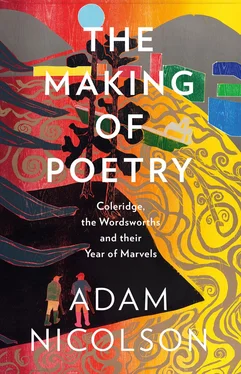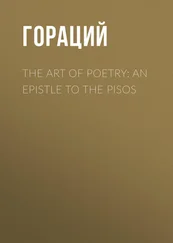The Coleridges had dreamed of a perfect rural retreat in which the consolations of nature, a bit of ground to cultivate and vegetables to grow, would provide the life in which Hartley could blossom and his parents could be happy. They had been promised for a moment a beautiful little smallholding in the valley at Adscombe, the far side of Over Stowey and just under the Quantocks, but that had fallen through, and Lime Street was all that was on offer. It was scarcely the place for bliss, but as one of their visitors wrote to his sister, ‘Here you can be happy without superfluities. Coleridge has a fine little boy about nine or ten months old. This child is a noble, healthy-looking fellow, has strong eyebrows and beautiful eyes. It is a treat, a luxury, to see Coleridge hanging over his infant and talking to it, and fancying what he will be in future days.’
Without doubt, gaiety rollicked around the house, for all their poverty and discomfort, toothache and neuralgia, and for all Coleridge’s habit of walking up and down, ‘composing poetry, instead of coming to bed at proper hours’. Among their friends this was a time of real delight, of games and laughter, of cups of flip and jugs of cider. Anna and John Cruikshank, the son of the Earl of Egmont’s steward and an admirer of Coleridge, had a child the same age as Hartley and often had them to supper at Ivy Cottage in Castle Street. Sara was friends with Mrs Roskilly, whose husband, the curate, ‘a most amiable liberal-minded man’, ran the boarding school. James Cole the watchmaker and his wife, John Brice the vicar of Aisholt, a beautiful green hamlet on the edge of the hills, and his daughters, and a whole family of Chesters, John and his sisters, all welcomed them in.
These were the more democratically-minded of Stowey’s inhabitants, the free thinkers, those for whom events in France and on the Continent had not been mere catastrophe. The conservative elements of the town continued to dislike and suspect the Coleridges. One Stowey woman thought Coleridge ‘an absent-minded, opinionated man, talking everybody down, fatiguing to listen to’, while William Holland, the diary-keeping rector of Over Stowey, despised anyone who associated with them.
The worlds of the Georgian vicar and the Romantic poets collide on the very first page of the earliest surviving volume of Holland’s diary, from October 1799. He and his wife Mary have gone shopping for a gown at Frank Poole’s ‘every-thing shop’ in St Mary’s Street, where, as usual, the unctuous Mr Poole ‘smiled and bowed graciously’. Then:
Saw that Democratic hoyden Mrs. Coleridge, who looked so like a frisky girl or something worse that I was not surprised that a Democratic libertine should choose her for a wife. The husband gone to London suddenly – no one here can tell why.
Here, from nowhere, a glimpse of the hostile world in which the poets were living. Hoyden – rude, rough, dirty, saucy, immodest, whorish, sexual, self-sufficient, not submitting to the requirements of social deference or feminine modesty. Frisky – only ever used elsewhere by Holland of horses that had not been adequately exercised. Something worse – salacious talk of the Fricker girls’ sexual mores in Bristol and in London, where, in another euphemism, they had been described as ‘haberdashers’, had reached Stowey. Democratic – suspect, Francophile, eroding all that Holland valued most. Libertine – the fusion of the worst sexual and political freedoms. No one here can tell why – the hostile, supervisory talk in the street. The reality was that the Coleridge marriage was in crisis and ‘the husband’ had gone north to see the Wordsworths.

Sally Pally
What in the end emerges from this cascade of disapproval? The alluring freedom, directness and attractiveness of Sara Coleridge in 1799, a liberty woman in a closed and controlling world. Coleridge when he loved her called her ‘Sally Pally’, and it is Sally Pally Coleridge one should think of walking the streets of Nether Stowey, indifferent to the sneers of its inhabitants. When Southey, in the midst of a ferocious row with her husband, pouring ‘heart-chilling sentiments’ into the room, had claimed that he liked Coleridge more than ever, Sara ‘affronted [him] into angry Silence by exclaiming What a Story!’ It is one of the ironies of this year, so carefully and agonisingly dedicated to the finding and telling of truths, that one of its principal truth-tellers was excluded from its inner circle.
Coleridge loved the Quantocks, but the centre of Nether Stowey for him, and the reason he was there, was neither a landscape nor a building but a man. Tom Poole was a tanner, in his mid-thirties, the son of a tanner and entirely self-educated, bright-eyed, ‘not of a yielding disposition’, and with a rough and abrupt manner that he never attempted to refine or conceal.
In the early 1790s he had read The Rights of Man by Tom Paine and had been radicalised by the news from France. A network of Pooles – lawyers, landowners, men of the cloth, ‘the very top of the yeomanry’, the Reverend Holland called them – was spread across Stowey, Bridgwater and the neighbouring villages. Except for Tom’s brother Richard, most of them disapproved of him. His cousin Charlotte bristled with resentment: ‘Tom Poole,’ she told her journal, ‘has imbibed some of the wild notions of liberty and equality that at present prevail so much.’ He had set up a book society in Stowey, and when Richard Symes, a Bridgwater lawyer, found a young man with a copy of The Rights of Man given to him by Poole, he tore it from his hand and stamped it to shreds on the pavement of Castle Street. Effigies of Tom Paine had been burned in Bridgwater and Taunton, and after Poole prevented the same being done in Stowey, stories ran around the rumour-networks of his town that he was now distributing seditious pamphlets. There is no doubting his radicalism. It went much further than a simple concern for the poor of Somerset. When war broke out against France he was unequivocal:
Many thousands of human beings will be sacrificed in the ensuing contest; and for what? To support three or four individuals, called arbitrary kings, in the situation which they or their ancestors have usurped. I consider every Briton who loses his life in the war as much murdered as the King of France, and every one who approves the war, as signing the death warrant of each soldier or sailor that falls.
He tormented Stowey with his democratic sentiments. He talked politics when out shooting woodcock. He thought England ‘a declining country, too guiltily leagued with despots’. He told whoever would listen that if he ever had a son he would call him John Hampden, after the great seventeenth-century revolutionary, and was always ready to have some good radical talk in his parlour, providing a comfortable and well-stocked book room in his own house for Coleridge and others to read and write in, helping with his mother – another committed radical – to make the new radical hotbed of the cottage in Lime Street as comfortable as he could. To his cousin Charlotte, he was a propagandist. She thought he always wanted ‘to load the higher class of people indiscriminately with opprobrium, and magnifies the virtues, miseries, and oppressed state of the poor in proportion’.
Not surprisingly, Poole started to come to the attention of the government’s spy networks. His letters were secretly opened and their contents reported to Whitehall. A Bridgwater friend told him that he was
considered by Government as the most dangerous person in the county of Somerset, and, as it was well known that this part of the country was disaffected, the whole mischief was, by Government, attributed to me.
Читать дальше













